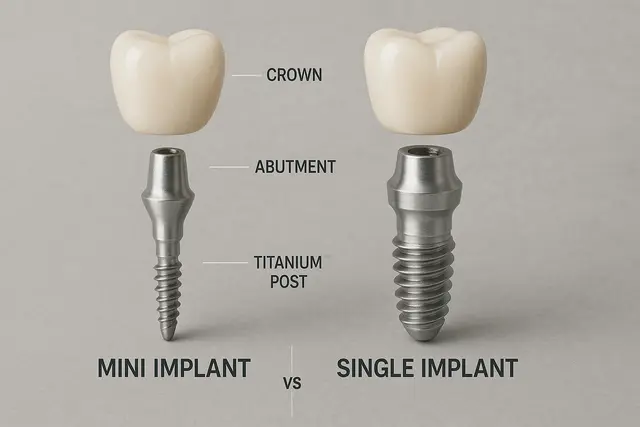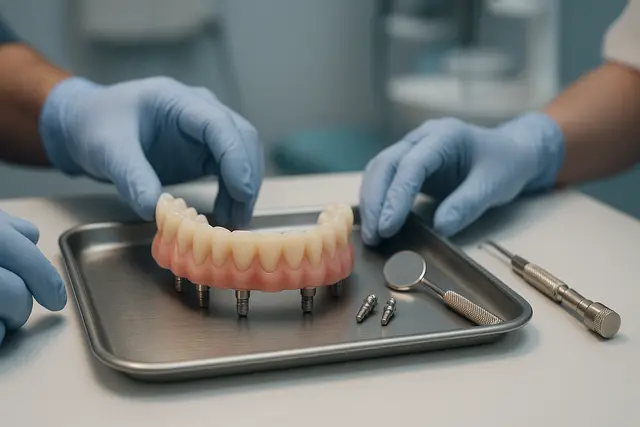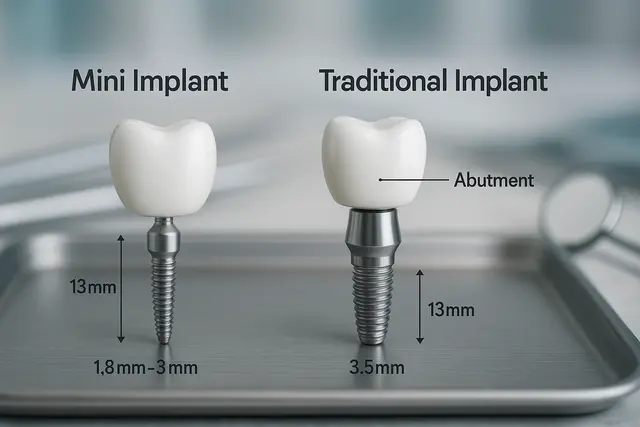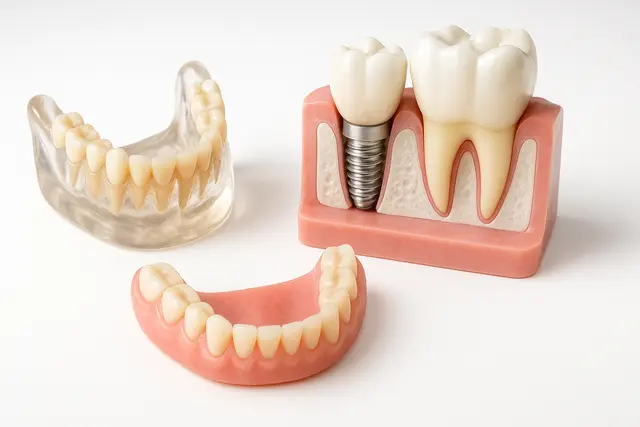Prosthodontics
5 min read
Oct 22, 2025
Single Implant vs. Mini Implant: Key Differences, What Sets Them Apart
Missing teeth can impact everything from your confidence to your ability to eat comfortably. Thankfully, dental implants offer effective solutions, but not all implants are the same. Understanding the difference between a single implant and a mini implant can help you make the right choice for your needs.

Missing a tooth isn’t just a cosmetic hiccup. It can mess with how you chew, talk, smile, and even how confident you feel in a room full of people. Thankfully, modern implant dentistry has come a long way. If you’ve been poking around online, you’ve probably come across two terms over and over: single implant and mini implant. Sounds similar, right? But the truth is, they’re more like cousins than twins.
So, let’s break down the key differences between these two types of dental implants without the dental school lecture. We’ll keep it real, clear, and, dare we say, kind of fun.
Dental Implant Options That Fit Real Life
The Dental implants are made from titanium and are used to replace missing teeth. A traditional dental implant (aka standard implant) is basically a tiny, sturdy post that acts like a tooth root. Once placed into the bone socket of missing teeth, it fuses with your jawbone over time, a process called osseointegration. This creates a rock-solid foundation for artificial teeth that look and feel natural.
A mini dental implant is a bit of a twist on that classic. As the name hints, it’s smaller in diameter, about half the size of a regular implant. But don’t let the size fool you; these little guys can do a lot, especially when space or bone volume is limited.
Mini Dental Implant vs Traditional Implants
Here’s where it starts to get interesting. Traditional implants usually comprise two pieces: the implant post and an abutment that holds dental prosthesis. Mini dental implants are generally a solid, one-piece design. That makes mini implants less invasive, both in placement and healing.
Traditional implants are often used when patients have enough bone density and are looking for a long-term fix. They take more time to place and heal, but they’re sturdy and versatile.
Mini dental implants may be the better pick if you’re not wild about longer recovery times or if your jawbone isn’t playing nice. They’re commonly used to hold removable dentures in place, which can be a game changer if you’re tired of having your dentures out and put back in like a contact lens dance.
How Dental Implants Work in Real Terms
Whether we’re talking implants or mini, the concept is similar: place something in the bone that acts like a root, attach artificial teeth, and give you back your smile. The difference between a mini implant and a standard implant mostly lies in size, healing time, and what your mouth can handle.
A conventional implant takes a bit more prep. It often requires a surgical flap and a few months to heal before placing the crown. Mini implants? They can be placed and restored quicker, sometimes even on the same day as the implant placement.
Implants vs. Traditional Dentures
Let’s be honest. Traditional dentures have their place, but they can slide, wobble, and generally misbehave. Implants provide a stable, secure fit for dentures, especially when using small diameter implants like minis. That snug fit from rubber o-rings on dentures that click around the mini implant balls? Chef’s kiss.
Old-school dentures are still around, and they work well for some. But implants provide a secure, permanent-feeling solution. Many patients say it feels like they’ve got their natural teeth back.
People who used to put their dentures out and put them in a glass at night? Now they’re asking about implants to replace their old hardware.
Key Differences That Actually Matter
So what are the key differences? A standard implant is thicker, usually stronger, and suitable for more complex cases. Mini implants are about half the diameter and used when space or bone is limited.
Standard implants and mini dental implants both offer long-term solutions, but the implant procedure, healing time, and cost can vary. Mini implants are less invasive, faster to place, and usually more affordable. But they might not be the best option for everyone.
The Pros and Cons of Mini Dental Implants
Pros:
Less invasive
Quicker ecovery
Can be placed same-day
Lower cost
Great for holding dentures in place
Cons:
Not as strong as traditional implants
Not ideal for replacing molars or high-bite-force areas
May not last as long in some cases
Makes mini implants sound pretty great, right? But remember, there’s no one-size-fits-all in implant dentistry.
Mini Implants and Standard Implants: What to Expect
This is where your dentist or experienced implant dentist earns their paycheck. There’s no one-size-fits-all answer. Some implants require more bone support, while others are okay with less. Some patients want to skip the surgery; others want the strongest, longest-lasting fix.
If you're interested in mini dental implants but not sure if you’re a candidate for a regular implant, talk to a pro who offers both options. Implants usually come with high success rates, but your individual needs, budget, and timeline matter.
Implants Are Unique in Dentistry
Implants are unique in dentistry because they don’t just replace the tooth, they mimic the root. That matters a lot when it comes to preserving your jawbone and keeping your smile looking natural.
Mini implants are often used to replace single teeth or to hold removable dentures in place. They’re a fantastic option for people who don’t want or can’t have extensive surgery.
Mini Implants and Standard Implants Compared Side by Side
Feature | Standard Implant | Mini Implant |
Diameter | Larger | Small diameter implants |
Procedure | Surgical flap, longer healing | Less invasive, often flapless |
Strength | Stronger | Less robust |
Time | Multiple visits | Often same-day as the implant placement |
Use Case | Single teeth, bridges, molars | Dentures, narrow spaces |
Cost | Higher | Lower |
Mini Implants vs Traditional D ental Implants: Real Talk
Implants come in two main flavors, and each has its place. Mini implants are smaller and quicker to place. Traditional ones are stronger and more versatile.
When you're comparing mini dental implants vs traditional dental implants, think about your lifestyle. Do you want to minimize appointments? Is cost a big factor? Do you need to replace molars or just hold dentures in place?
A big advantage of mini implants is they can be used in people who don't have enough bone to make standard implants viable. Since mini implants are smaller, they require less bone and often skip the need for grafting.
Choosing the Right Implant Is Right for You
Only your implant dentist can truly say which implant is right for your needs. Whether you're interested in mini dental implants or traditional options, your dentist will take into account everything from your jaw structure to your daily habits.
The American Academy of Implant Dentistry recommends talking to a professional trained in implant dentistry to explore the best fit.
Mini implants are generally ideal when you need to replace missing teeth with minimal fuss. Traditional implants shine when you want long-lasting strength and flexibility.
What Is the Difference Between a Mini Implant and a Traditional Dental Implant?
The primary difference lies in size and structure. Traditional implants are larger and consist of two pieces, the implant post and a separate abutment, while mini implants are smaller and typically one solid unit. Standard implants require more bone support and a longer healing time, but they offer greater strength and durability. Mini implants are less invasive, often placed without surgical flaps, and may be used when bone volume is limited.
When Is a Mini Implant a Better Option Than a Standard Implant?
Mini implants are often ideal for patients with limited bone density or those seeking a quicker, less invasive treatment. They are especially useful for stabilizing dentures and replacing smaller teeth in tight spaces. Because they usually don't require bone grafting and have shorter recovery times, mini implants can be a good fit for patients who want same-day results or can’t undergo complex surgeries.
Are Mini Implants as Durable as Traditional Implants?
Mini implants are durable but generally not as strong as traditional implants, especially in areas of the mouth that experience high bite pressure, such as the molars. While they can last several years with proper care, they may not offer the same long-term performance as standard implants, which are designed to last decades and support heavier chewing forces. Your dentist will evaluate which option suits your specific needs.
How Do Costs and Recovery Times Compare Between the Two Options?
Mini implants tend to be more affordable and offer faster recovery since the procedure is less invasive. They often don’t require multiple visits or months of healing, which makes them convenient and cost-effective in the short term. Traditional implants, while more expensive upfront, offer a longer-lasting and more robust solution that may be more cost-effective over time due to fewer replacements or adjustments.
Read Next
Related Posts

Prosthodontics
Permanent Fixed Implant Dentures Overview: Best Solution for Full-Mouth Restoration
Gone are the days when dentures meant bulky, uncomfortable teeth soaking in a bedside glass. Modern dentistry has completely transformed the way we approach tooth replacement, offering solutions that are more natural-looking, stable, and long-lasting than ever before.
5 min read
Oct 22, 2025

Prosthodontics
Mini Implants vs. Traditional Implants: How They Work and When to Choose Each
Missing teeth can impact more than just your appearance, they can affect your confidence, oral health, and ability to enjoy everyday activities like eating and speaking. Fortunately, dental implants offer a reliable solution. But when it comes to choosing between mini implants and traditional implants, the differences can be surprisingly significant.
5 min read
Oct 21, 2025

Prosthodontics
How to Choose Between Dentures and Implants for Tooth Replacement
Losing teeth can be a tough experience, physically, emotionally, and socially. Fortunately, modern dentistry offers reliable solutions to restore both function and confidence. Among the most popular options are dentures and dental implants, each with its own advantages depending on your needs, health, and lifestyle.
6 min read
Oct 21, 2025
Don’t have time to research every dentist around you?
See why 30k+ patients trusted us